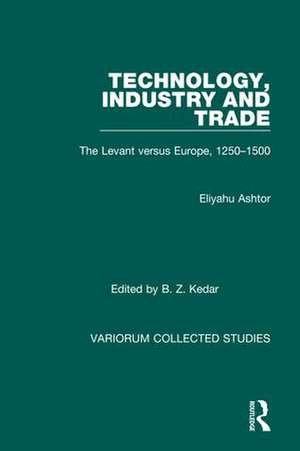Technology, Industry and Trade: The Levant versus Europe, 1250–1500: Variorum Collected Studies
Autor Eliyahu Ashtor, Benjamin Z. Kedaren Limba Engleză Hardback – 28 apr 1992
Din seria Variorum Collected Studies
-
 Preț: 313.38 lei
Preț: 313.38 lei -
 Preț: 311.41 lei
Preț: 311.41 lei -
 Preț: 308.04 lei
Preț: 308.04 lei -
 Preț: 325.68 lei
Preț: 325.68 lei -
 Preț: 406.12 lei
Preț: 406.12 lei -
 Preț: 311.18 lei
Preț: 311.18 lei -
 Preț: 325.31 lei
Preț: 325.31 lei -
 Preț: 396.01 lei
Preț: 396.01 lei - 9%
 Preț: 1039.89 lei
Preț: 1039.89 lei -
 Preț: 266.20 lei
Preț: 266.20 lei -
 Preț: 358.42 lei
Preț: 358.42 lei - 9%
 Preț: 938.10 lei
Preț: 938.10 lei -
 Preț: 351.48 lei
Preț: 351.48 lei - 9%
 Preț: 938.86 lei
Preț: 938.86 lei -
 Preț: 335.37 lei
Preț: 335.37 lei - 9%
 Preț: 937.14 lei
Preț: 937.14 lei -
 Preț: 351.42 lei
Preț: 351.42 lei -
 Preț: 328.48 lei
Preț: 328.48 lei - 38%
 Preț: 766.84 lei
Preț: 766.84 lei - 23%
 Preț: 315.48 lei
Preț: 315.48 lei - 36%
 Preț: 740.06 lei
Preț: 740.06 lei - 38%
 Preț: 764.20 lei
Preț: 764.20 lei - 39%
 Preț: 684.75 lei
Preț: 684.75 lei - 29%
 Preț: 247.40 lei
Preț: 247.40 lei - 37%
 Preț: 488.89 lei
Preț: 488.89 lei - 38%
 Preț: 766.91 lei
Preț: 766.91 lei - 38%
 Preț: 769.51 lei
Preț: 769.51 lei - 38%
 Preț: 769.85 lei
Preț: 769.85 lei - 36%
 Preț: 823.43 lei
Preț: 823.43 lei - 25%
 Preț: 225.28 lei
Preț: 225.28 lei - 27%
 Preț: 225.54 lei
Preț: 225.54 lei - 38%
 Preț: 767.07 lei
Preț: 767.07 lei - 38%
 Preț: 764.20 lei
Preț: 764.20 lei - 36%
 Preț: 736.38 lei
Preț: 736.38 lei - 34%
 Preț: 738.43 lei
Preț: 738.43 lei - 27%
 Preț: 226.52 lei
Preț: 226.52 lei - 37%
 Preț: 491.66 lei
Preț: 491.66 lei - 37%
 Preț: 485.78 lei
Preț: 485.78 lei - 37%
 Preț: 485.78 lei
Preț: 485.78 lei - 38%
 Preț: 766.34 lei
Preț: 766.34 lei - 36%
 Preț: 739.17 lei
Preț: 739.17 lei - 34%
 Preț: 473.94 lei
Preț: 473.94 lei - 18%
 Preț: 843.63 lei
Preț: 843.63 lei - 38%
 Preț: 774.91 lei
Preț: 774.91 lei - 38%
 Preț: 769.92 lei
Preț: 769.92 lei - 38%
 Preț: 764.20 lei
Preț: 764.20 lei - 50%
 Preț: 488.81 lei
Preț: 488.81 lei - 36%
 Preț: 488.49 lei
Preț: 488.49 lei - 38%
 Preț: 769.10 lei
Preț: 769.10 lei - 38%
 Preț: 766.99 lei
Preț: 766.99 lei
Preț: 241.15 lei
Preț vechi: 332.14 lei
-27% Nou
Puncte Express: 362
Preț estimativ în valută:
46.15€ • 50.11$ • 38.77£
46.15€ • 50.11$ • 38.77£
Carte tipărită la comandă
Livrare economică 22 aprilie-06 mai
Preluare comenzi: 021 569.72.76
Specificații
ISBN-13: 9780860783237
ISBN-10: 0860783235
Pagini: 350
Dimensiuni: 150 x 224 mm
Greutate: 0.45 kg
Ediția:1
Editura: Taylor & Francis
Colecția Routledge
Seria Variorum Collected Studies
Locul publicării:Oxford, United Kingdom
ISBN-10: 0860783235
Pagini: 350
Dimensiuni: 150 x 224 mm
Greutate: 0.45 kg
Ediția:1
Editura: Taylor & Francis
Colecția Routledge
Seria Variorum Collected Studies
Locul publicării:Oxford, United Kingdom
Cuprins
Contents: Preface; Le Proche-Orient au Bas Moyen Age: une région sous-développée; The economic decline of the Middle East during the Later Middle Ages - an outline; Levantine sugar industry in the Later Middle Ages - an example of technological decline; L’ascendant technologique de l’Occident médiéval; Aspetti della espansione italiana nel Basso Medioevo; L’apogée du commerce vénitien au Levant: un nouvel essai d’explication; Levantine alkali ashes and European industries; The factors of technological and industrial progress in the Later Middle Ages; The Jews in the Mediterranean trade in the later Middle Ages; Index.
Notă biografică
Eliyahu Ashtor, Benjamin Z. Kedar
Descriere
This is the fifth collection of articles by Eliyahu Ashtor to be published by Variorum and focuses on the fundamental question of why, during the later Middle Ages, technology and industry declined, even collapsed, in the Muslim Levant, while simultaneously making enormous progress in the Christian West. An indefatigable researcher in archives all over the Mediterranean, Ashtor amassed quantities of data on this subject, and began to propose causal links between, on the one hand, demographic trends, types of political regime, economic policies and attitudes towards innovation, and on the other, the progress or decline of technology and industry. Although his work was cut short by his death in 1984, the information that Ashtor has made available, for instance on the sugar and the alkali industries, and the questions and hypotheses he has suggested will provide a vital basis for continuing research. The final article, dealing more specifically with the history of commerce, represents in effect a summation of the author's views on the role of the Jews in the trade of the Mediterranean.
